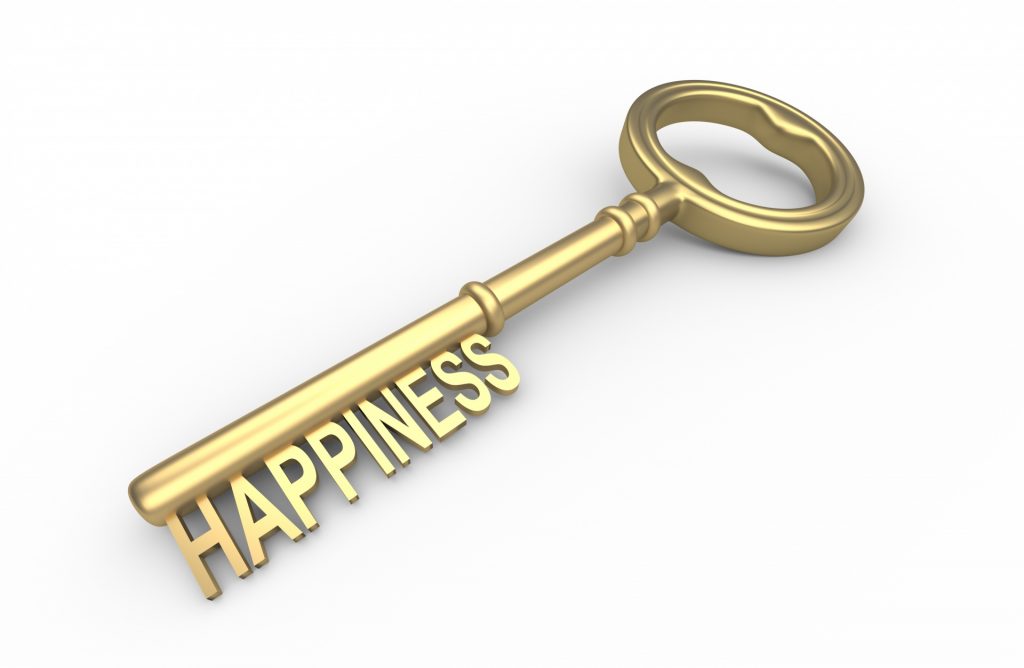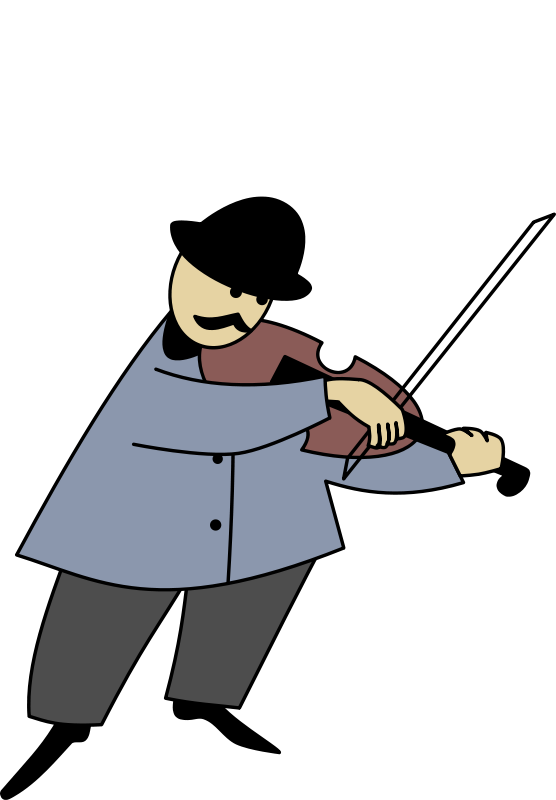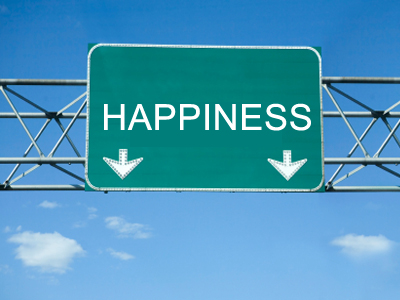Halachah
In the Talmud, one of the primary sources for traditional Jewish Law (Halachah), happiness and sadness are associated with specific months of in the Jewish calendar. One is meant to increase in happiness during the month of Adar and decrease in happiness during the month of Av. In Jewish Law, rejoicing during the Jewish holidays is considered a biblical commandment. Maimonides, Mishneh Torah, Laws of the Lulav 8:15.
משנכנס אדר מרבין בשמחה
There is a Jewish custom to hang a sign in one’s home on which is written “When Adar comes in, increase in happiness” Mishenichnas Adar marbin b’simcha, משנכנס אדר מרבין בשמחה

On a personal note
Like many, I am fascinated with the idea of pursuing happiness, every single day. One of the things I’ve learned is that in order for me to elevate myself into a state of joy, I have to become aware of, and let go of toxic thought patterns. Toxic thought patterns prevents from us all to live a happier life, thought patterns which prevented me from being in a state of joy.
After many months of social distancing, the fact that there’s so much of an urgency to disconnect, creates a lot of fear with people. “Humans are wired to be social creatures, and that’s how we cope when a big disaster happens,” said Judith Moskowitz, a professor of medical social science at Northwestern University’s Feinberg School of Medicine. “Now, we’re being told to cope with this by staying away from each other.” True, we all have good reasons to be upset and sad, but it’s not healthy for us. How come we agree to live unhealthy, unhappy life? The art of being b’simchah, being happy, is a hard work. So how do you live a happy life? Is it really possible?
The Bible is full of of verses that speak of joy, rejoicing, and being happy. It was Leo Tolstoy who said, “Happiness does not depend on outward things, but on the way we see them”.
Fear and Hate versus Love & Joy
I’m sure we can all agree that Love & Joy are higher state of being than Fear & Hate. Joy takes time, effort and a daily commitment to attain and maintain.
With this blog I will humbly try to share many pearls of wisdom, based on Torah, Talmud, Psalms, sacred text, wise people, books I’ve read, comforting and elevating pearls of wisdom, for practical daily use. These pearls of wisdom are an essential part of maintaining my state of joy. Some days are more challenging than others, I’m not always joyous, no one is, but there many pearls of wisdom awaiting for us all to be picked up, as God’s precious gift to us.
Being happy is our natural state of being. Need evidence? look at children, before they reach the age of self-awareness they have no worry and they are happy, like we used to be as little children…
“Judge nothing, you will be happy. Forgive everything, you will be happier. Love everything, you will be happiest.”- Sri Chinmoy
What is happiness?
Many people spend a large amount of their time striving for, and praying for a lot of money, a fulfilling romantic relationship, a successful career, a beautiful house, a luxurious car, thinking these are the keys to happiness and peace of mind, only to find that once you get them, you keep wanting the next best thing. There is always a next best thing or a desire waiting to be fulfilled, with the hope that it will make you feel “happy”, an illusion dangling like a carrot just out of your reach. We seem to always want more, the more the merrier when it comes to the outside world. We all know people who seem to “have it all,” but don’t seem to be happy at all. How come?

What You Want Versus What You Have
People who are more satisfied with what they have are happier overall. A University of Northern British Columbia study in the 1980’s found that people who aspired to have more money, friends, career success, and health than others were less happy. Being content with what they had was linked to a higher level of satisfaction and happiness.

So, What IS Happiness?
The research suggests that happiness is a combination of how satisfied you are with your life and how good you feel on a day-to-day basis. Psychologist David Lykken says that our “set point” of how happy we are is determined by genes, but the good news is that with consistent effort, regardless of your genetics, you can learn how to become a happy person. whether we can overcome this depends on training and experience. Even with a low “set point,” a person can encourage themselves to be happy with the power of positive thinking.
Pearls of wisdom

In his book “The Power of Positive Thinking: A Practical Guide to Mastering the Problems of Everyday Living” published in 1952, Norman Vincent Peale shares many pearls of wisdom in regards to happiness, and the ways to attain and maintain a state of happiness. I’ll quote three pearls of wisdom from his book “To become a happy person have a clean soul, eyes that see romance in the commonplace, a child’s heart, and spiritual simplicity.” “Our happiness depends on the habit of mind we cultivate.” and “Without a humble but reasonable confidence in your own powers you cannot be successful or happy.”
What makes us happy?
Those who feel they deserve everything can never be satisfied. Those with no expectations, who feel they deserve nothing, that every breath is a gift- they carry an inner joy in all they do.
Rich versus Poor- A Story

There was a boy, whose family was very wealthy. One day his father took him on a trip to the country, where he wanted to show his son, how poor people live. So they arrived to a farm of a very poor family, as he considered. They spent there several days. On their return, the father asked his son, “Did you notice how poor people live?” “Yes, I did“- said the boy, “We have one dog, and they have four of them. In our backyard there is a pool, while they have a river that has no end. We’ve got expensive lanterns, but they have stars above their heads at night. We have the patio, and they have the whole horizon. We have only a small piece of land, while they have the endless fields. We buy food, but they grow it. We have high fence for protection of our property, and they don‘t need it, as their friends protect them.”
The father was stunned. He could not say a word. Then the boy added: “Thank you, dad, for letting me see how poor we are.”
This story shows that the true wealth as well as happiness is not measured by materials things. Love, friendship and freedom are far more valuable.
Rabbi Eliyahu Eliezer Dessler said “There is no happiness in the world of material things; there is only happiness in spiritual concerns. The one who enjoys a rich spiritual life is happy. There is no other kind of happiness in existence.”
Maslow’s hierarchy of needs
“A spiritually established life is not an easy task. But a materially satisfied life is an impossible task.”– Sri Chinmoy

Many years ago, when I took a college course in Psychology I’ve learned about Maslow‘s hierarchy of needs, a pyramid depicting the levels of human needs, psychological, and physical. When a human being ascends the steps of the pyramid, he reaches self-actualization. The highest level of being. Beyond the routine of basic needs fulfillment, Maslow envisioned moments of peak experiences, profound moments of love, understanding, and happiness, during which a person feels more alive, and yet a part of the world.
A Simchah
Happiness is not specified in the Torah as a separate mitzvah. Yet, throughout the Talmud, Midrash and Kabbalah, joy is central in all areas of Judaism. A popular teaching by Rabbi Nachman of Breslov, a 19th-century Chassidic Rabbi, is “Mitzvah Gedolah Le’hiyot Besimchah Tamid,” it is a great mitzvah (commandment) to always be in a state of happiness. One of the early Chasidic masters, Rabbi Aharon of Karlin said, “There is no mitzvah to be joyous, but joy can bring on the greatest mitzvot.” It is also true, he said, that “it is not a sin to be sad, but sadness can bring on the greatest sins.”
The pursuit of happiness
There are many lists and guides out there, promising to help us become happy / happier people. The truth is you can’t have your cake and eat it too. You can’t simultaneously be in the midst of pursuing something, including happiness, and be happy at the same time. As happiness is a state of pursuing nothing. Having no expectations, however, there are habits which helps us be in a state of happiness.
The 8 keys to happiness


GIVE– “We make a living by what we get. We make a life by what we give.” -Winston S. Churchill. If you want to feel good, do good to others.

FORGIVE & FORGET – “ The stupid neither forgive nor forget; the naive forgive and forget; the wise forgive but do not forget.”- Thomas Szasz. Forgiving yourself and then the others, allows you to live more freely. Forgiveness does not mean forgetting but acceptance.

GRATITUDE – “Gratitude is the sweetest thing in a seeker’s life- in all human life. If there is gratitude in your heart, then there will be tremendous sweetness in your eyes”- Sri Chinmoy. “Modah Ani Lefanecha” Know how to thank and express to those and to yourself how grateful you are for the life you have and for all these beautiful things that happen every day.

SELF-CARE– “You yourself, as much as anybody in the entire universe, deserve your love and affection.” –Buddha

DON’T COMPARE YOURSELF TO OTHERS– “A flower does not think of competing to the flower next to it, it just blooms”- Zen Shin

LEARN TO SAY NO– “It’s only by saying NO that you can concentrate on the things that are really important.” – Steve Jobs

HAVE A PURPOSE IN LIFE– “The two most important days in life are the day you born and the day you find out why.” – Mark Twain

BE OPTIMISTIC – “The mind is everything. What you think you become.” – Buddha. Be always optimistic about life. If you choose to be happy, you will be happy; because happy people don’t have the best of everything, instead they choose to make the best of everything.
Why it’s so hard to be happy?

Considering our daily pressures, workloads, and now, living in The Corona Era, it is very easy to understand why Joy is the hardest of all levels to attain and maintain. If you want to be a happy person you need to create a positive set of mind. Another key to happiness is to understand the importance of our thoughts . Our Thoughts have the power to shape our lives and also create our Happiness. Positive thinking leads to positive feelings leads to positive actions.
Kabbalah
The Zohar, a central text in Kabbalah notes that the Hebrew word for “in happiness” b’simchah, בשמחה contain the same letters as the Hebrew word for “thought” machshava, מחשבה referring to idea that the key to happiness is found in our thoughts, by training oneself to weed out any negative thought that prevent one from experiencing happiness.
Moses, the humble person

“And the man Moses was very humble, more than any man on the face of the earth.” Moses awareness of his greatness, did not effect him. He remained the most humble of men. He was able to do this because he felt that all this was given to him from above.
The humble person feels he deserves nothing and so is always in a state of joy. Whatever a humble person receives is a gift, and a cause for a great celebration. And if he sometimes lacking, that doesn’t sadden him either, since he feels he doesn’t deserve anything anyways, so why should he be depressed? This type of humility is a channel for joy. For as soon as you begin to feel your own existence, you have lost the opportunity for true joy.
Happy children

Happiness is the natural human state. Unless a child is hungry or thirsty or tired, or needs attention, a child is happy for no reason at all. Children are not self-conscious. They are free to be happy because they are not yet aware of themselves. It is only when we mature and become more self-aware that we also become worried and have unfulfilled desires and unrealized dreams. None of us can honestly say we have it all, and we can always find reasons to be sad. But a child is looking at the cup half full, and isn’t bothered by what he/she is “missing,” so he/she does have it all. The child’s lack of self-consciousness leaves him/her free to enjoy life and be happy.
According to the Chasidic Rabbi Moshe Leib of Sassov (1745–1807), a prayer filled with joy is greater than a prayer filled with tears. Quoting the Talmudic saying “The gates of tears are never locked”, Rabbi Mosheh states that for tears, the supernal gates are simply unlocked, while joy has the ability to destroy the gates completely.

According to Maimonides, happiness is an essential element in the performance of Jewish rituals. Maimonides rules in his Code, Yad Hachazakah, that the performance of all commandments must accompany an abundance of joy. The joy that a person takes in performing a mitzvah and in loving God Who commanded it is itself a great [divine] service.

The Talmud states “One should not stand up to pray while immersed in sorrow, or idleness, or laughter, or chatter, or frivolity, or idle talk, but only while rejoicing in the performance of a commandment (b’simcha shel mitzvah).”
SIMCHAH, CELEBRATING JOY

by Dr. Rachel Zohar Dulin / The Dayton Jewish Observer- “The most recognized word for happiness in Hebrew is Simchah. It’s considered a gift to mankind (Ecc. 2:26), and the Torah advocates, “vehayita ach sameach, you should have nothing but joy (Deut. 16:15).” Let us briefly explore the meaning of this word. The noun Simchah is mentioned in the Bible 94 times and is derived from verb samach, which appears 154 times in the text. It is rooted in the Akkadian word shamahu meaning sprout or flourish. Interestingly, in Hebrew, the verb received two opposite meanings. Most of the times Simchah means rejoicing, happiness, gaiety, contentment, joyful occasion and festivity. But occasionally the word is used negatively, expressing mockery, ridicule and malice. Indeed, on the dark side, Simchah exposes those who wish ill on others and rejoice in their misfortune. The prophet Micah (7:8), the Psalmist (38:17), and the wisdom writer (Prov. 14:13), all recognized that the word Simchah may evoke a sneering emotion. The Modern Hebrew idiom Simchah laaid, malicious joy, is based on the old teaching, “Sameach laaid, lo yinakeh, He who rejoices in another’s misfortune will not go unpunished (Prov 17:5).”
On the bright side, Simchah is a word laden with exhilaration and festive activities. Simchah expresses not only the joy of an event, but it is also the noun which means a happy event. A holiday is a Simchah, a family gathering is a Simchah, a wedding is a Simchah, the birth of a child is a Simchah, and a Bar or Bat Mitvah is a Simchah. The host of an event is a Baal Simchah and the sound of joy resonating from the event is Kol Simchah. Simchat yetzirah, a joy of creativity, is a way to describe the exhilaration one feels while being engaged in a creative process.
We should mention two rabbinic teachings related to Simchah . The first advocates “Ain mearvin simcha besimchah, One joy should not be mixed with another,” as for example, a wedding should not be celebrated on a holiday (Moed Katan 8). But figuratively the phrase teaches that different and unrelated matters should not be mixed in discussion or action. Each issue or event should be dealt with separately and on its own merit. The second rabbinic teaching concerning Simchah points to the inner self as the source of contentment and joy. “Aizehu ashir? Hasameach bechelko, Who is rich? He that rejoices in his own portion (Avot 4:1).”
We conclude with the old idiom, which exclaims, “Ain simcha ela beyayin,” There is no joy without wine. Therefore, let us raise a cup and say l’chayim (to life) together with those who are celebrating a special simcha.
Happiness and marriage

The Talmud and Midrash also associate joy with marriage. “Any man who has no wife lives without joy, without blessing, and without goodness.” - Talmud, Tractate Yevamoth, 62a.
Rabbi Israel Baal Shem Tov (1698-1760), the founder of the Chassidic movement, was once asked: “Why is it that chassidim burst into song and dance at the slightest provocation? Is this the behavior of a healthy, sane individual?” The Baal Shem Tov responded with a story.
The power of singing & dancing

Once, a musician came to town, a musician of great but unknown talent. He stood on a street corner and began to play. Those who stopped to listen could not tear themselves away, and soon a large crowd stood enthralled by the glorious music whose equal they had never heard. Before long they were moving to its rhythm, and the entire street was transformed into a dancing mass of humanity.

A deaf man walking by wondered: Has the world gone mad? Why are the townspeople jumping up and down, waving their arms and turning in circles in middle of the street? “Chassidim,” concluded the Baal Shem Tov, “are moved by the melody that issues forth from every creature in G‑d’s creation. If this makes them appear mad to those with less sensitive ears, should they therefore cease to dance?”
While many people try to find the path to happiness, what if we all stop for a moment and consider the possibility that such a path doesn’t really exist. Imagine being happy versus looking for a path that may lead to happiness. I truly believe:
THERE IS NO WAY TO HAPPINESS, HAPPINESS IS THE WAY!

Check out YedidYah Psalm 96 “Yiram Hayam” :
“The heavens shall be glad, and the earth shall rejoice: the sea in its fullness roar.” music by Rabbi Yakira copyright 2020 https://youtu.be/qQv3VZQWqEs
Happiness blog article was inspired by chabbad.org

